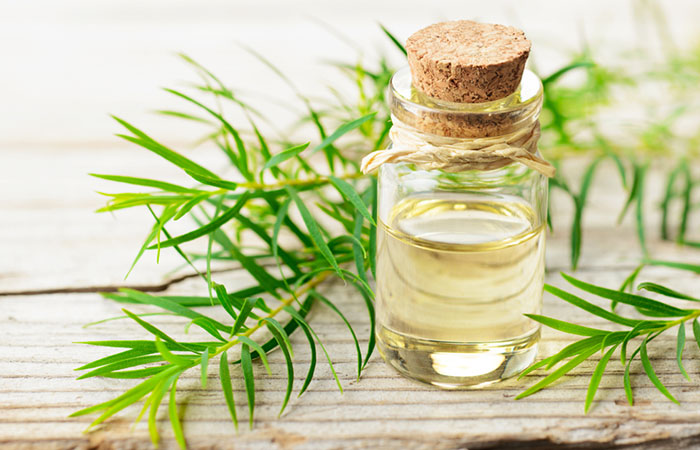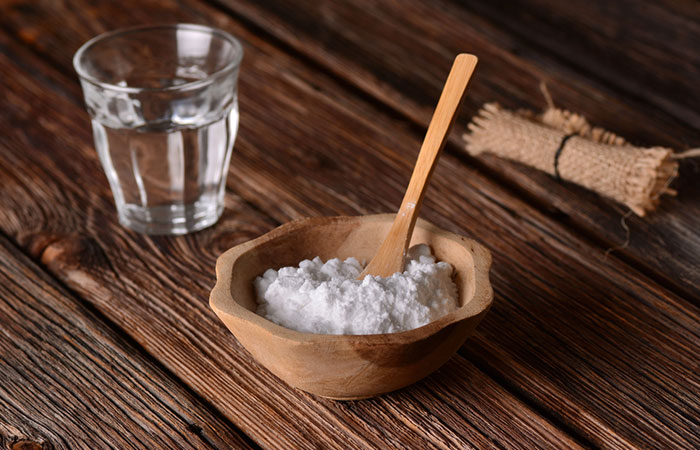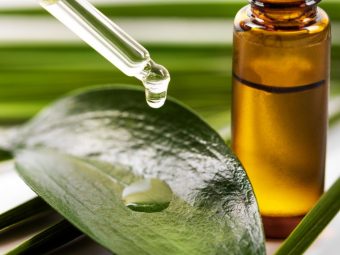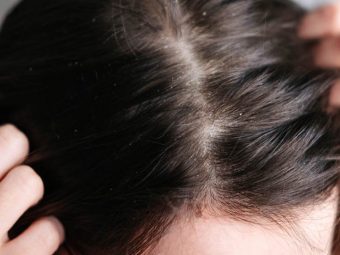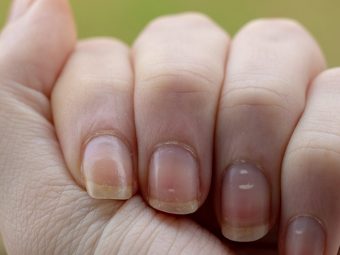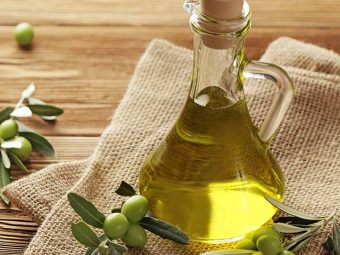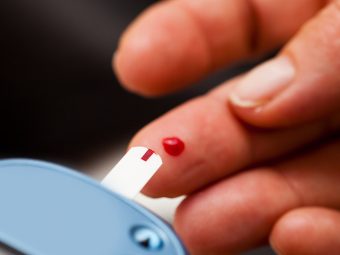13 Home Remedies For Toenail Fungus & Best Prevention Tips
Managing infected toenails is easier with simple ingredients available in your home.
Image: ShutterStock
Toenail fungus can be frustrating to deal with and unsightly to look at. Fortunately, there are some effective home remedies for toenail fungus that you can follow to get rid of it.
Toenail fungus is common and affects 14% of the people in the US (1). It is commonly found in the elderly. It usually results in discoloration and breakage. If left untreated, the fungus can harden the nails and spread to the other toes. While over-the-counter prescription medications are the best way to treat toenail fungus, people opt for natural alternatives to avoid their side effects. The good news is that there are various home remedies you can try along with prescription medication to bid your toenail fungus goodbye. Scroll down to know more!
In This Article
What Is Toenail Fungus?
Toenail fungus is a common condition that affects the toenails. It is also known as onychomycosis, and it occurs when fungi colonize the space between the toe and the toe bed (tissue right underneath the toenail), resulting in thick yellow or brown toenails. This typically occurs through a cut or crack in your toe. It is highly contagious and can spread to other toenails quickly (1).
According to a study conducted on 3,226 patients, onychomycosis is one of the most common nail infections seen in clinical practice. Out of these, 27.99% of the patients had onychomycosis. It was further noted that 81.49 % of men were infected with onychomycosis in their toenails than women (60.26%).
Toenail fungus can be caused by a variety of factors. Read the next section to find out all about it!
Causes Of Toenail Fungus
Nail fungal infections are typically caused by a class of fungi known as dermatophytes, which include species of Candida. Some of the common causes of a toenail fungal infection:
- Poor foot hygiene.
- Athlete’s foot.
- A nail injury.
- Previous infection.
- Sharing personal items, like a towel or a nail clipper.
- Physical contact with a person with toenail fungus.
- Sweaty socks and shoes.
Curious to know how to get rid of this condition? Check out the most effective home remedies and treatments for toenail fungus in the next section.
How To Get Rid Of Toenail Fungus
Home Remedies For Toenail Fungus
1. Tea Tree Oil
Using tea tree oil is a great home remedy for toenail fungus. It can be used to treat onychomycosis. Applying it topically can help treat the symptoms of nail fungus and improve the appearance of the affected nails (2).
You Will Need
- 2-3 drops of tea tree oil
- A carrier oil like coconut oil
- Cotton pad
What You Have To Do
- Mix a few drops of tea tree oil and coconut oil.
- Dab this mixture on a cotton pad and apply it to the affected toenail.
How Often You Should Do This
Apply this 2 times daily.
2. Vicks VapoRub
This decongestant is formulated using menthol that can help alleviate the symptoms of toenail fungus (3). Harjinder Sidhu, a YouTuber, dealing with toenail fungus shared how applying Vicks on the affected toenail helped heal the issue. He says, “This is something I have observed in my own life on my toenails and I got it cured by applying Vicks VapoRub (i).”
You Will Need
- Vicks VapoRub
- Sterile gauze
What You Have To Do
- Trim the affected nails and wash them.
- Apply some Vicks VapoRub on the affected nail.
- Cover the toe with sterile gauze and leave it on overnight.
How Often You Should Do This
Do this for a few weeks, every night before going to bed.
3. Snakeroot Extract
Snakeroot extract can help heal the affected toenail and alleviate the symptoms of toenail fungus (4).
You Will Need
- A few drops of snakeroot extract
- Water
What You Have To Do
- Mix a few drops of snakeroot extract with water.
- Apply this solution to the affected nail.
- Wash it off after an hour or so.
How Often You Should Do This
You can do this 2 times daily.
4. Oregano Oil
Oregano oil is an essential oil made from the oregano herb that possesses powerful antifungal properties (5). Hence, it can help alleviate the symptoms of a fungal nail infection by destroying its root cause.
You Will Need
- 3-4 drops of oregano oil
- 1 teaspoon of coconut oil
What You Have To Do
- Add three to four drops of oregano oil to a teaspoon of coconut oil.
- Mix well and apply it to the affected nail.
- Leave it on until it dries completely.
How Often You Should Do This
You can do this 2 times daily.
5. Olive Leaf Extract
Research shows that olive leaf extract exhibits antifungal properties (6). Its bioactive constituents can eliminate the fungal infection and make your toenail healthy again.
You Will Need
A few drops of olive leaf extract
What You Have To Do
- Apply a few drops of olive leaf extract to the affected toenail.
- Leave it on and let it dry.
How Often You Should Do This
You can do this 2 times daily.
6. Ozonized Sunflower Oil
Ozonized sunflower oil may exhibit fungistatic properties. This can make it suitable for treating toenail fungus as the ozone can diffuse into the fungal wall, thereby inhibiting its proliferation (7).
You Will Need
A teaspoon of ozonized sunflower oil
What You Have To Do
- Apply several drops of ozonized sunflower oil to the affected toenail.
- You must cover it with sterile gauze.
How Often You Should Do This
You can do this once daily. Also, you can use ozonated olive oil to treat the infection (7).
7. Vinegar
A vinegar foot bath is one of the common home remedies to treat toenail fungus. This can be attributed to the antimicrobial properties of the vinegar solution that can also prevent further infection (8).
You Will Need
- 1/2 cup of vinegar
- 2-3 cups of water
- A shallow tub
What You Have To Do
- Mix all the ingredients mentioned above in a shallow tub.
- Soak your feet in this solution for about 20 minutes.
How Often You Should Do This
Do this once daily.
8. Garlic
Garlic contains a bioactive compound called ajoene that possesses antimycotic properties (9). This helps garlic to fight the fungal infection that causes toenail fungus.
You Will Need
1-2 peeled garlic cloves
What You Have To Do
- Crush two cloves of fresh garlic.
- Apply this paste to the affected toenail.
- You must leave it on for half an hour and then wash it off with water.
How Often You Should Do This
You can do this 2 times daily.
9. Baking Soda
Sodium bicarbonate, commonly known as baking soda, exhibits antifungal activity against fungal infections (10). This makes it suitable for use in the treatment of toenail fungus or onychomycosis.
You Will Need
- 1-2 teaspoons of baking soda
- Water, as needed
What You Have To Do
- Prepare a paste by mixing baking soda and water.
- Apply this paste to the infected nail.
- Rinse it off after 20-30 minutes.
How Often You Should Do This
Do this 1 to 2 times daily.
10. Hydrogen Peroxide
A solution of hydrogen peroxide can be used as an antifungal agent (11). Its bioactive compounds can help eliminate toenail infection.
You Will Need
- 1 cup of hydrogen peroxide solution
- 3 cups of water
What You Have To Do
- Take a cup of 3% hydrogen peroxide solution and mix it with three cups of water.
- Transfer this solution to a small tub.
- Soak your feet in this solution for 20 minutes.
How Often You Should Do This
Do this once daily.
11. Aloe Vera
Aloe vera has wound healing and antifungal properties (12). Both these properties can help fight the dermatophytes that cause nail fungus.
You Will Need
Aloe vera gel
What You Have To Do
- Extract gel from a fresh aloe vera leaf.
- Apply it to the affected toenail.
- Leave it on for 20 minutes before washing it off.
How Often You Should Do This
Do this 1 to 2 times daily.
12. Mouthwash
Mouthwash contains active ingredients like cetylpyridinium chloride, chlorhexidine, essential oils, fluoride, and peroxide that exhibit antifungal properties (13). This may help treat onychomycosis.
You Will Need
- Mouthwash
- A bowl
What You Have To Do
Soak your toenail in a bowl of mouthwash.
How Often You Should Do This
Do this for 30 minutes daily.
13. Castor Oil
Castor oil may have antifungal attributes. A study showed that castor oil contains a compound known as undecylenic acid, which is renowned for its antimicrobial and antifungal properties (14). However, remember that the efficacy of castor oil against toenail fungus lacks scientific evidence and warrants further research. You should also consult a doctor before using it to prevent spreading the infection.
You Will Need
- 1 teaspoon of castor oil
- Gauze
What You Have To Do
- Apply several drops of castor oil to the affected toenail.
- Cover it with sterile gauze to prevent the infection from spreading.
How Often You Should Do This
Do this once daily.
Apart from the above-mentioned remedies, you can also apply calamine lotion, turmeric, apple cider vinegar, and onion on the infected toenail to help eliminate the infection and provide relief due to their antifungal properties (15), (16), (17). However, if these home remedies are not proving effective and the infection persists, consult a doctor about other treatment options.
Medical Treatments
Toenail fungus (onychomycosis) treatment differs based on the degree of the infection and the type of fungus that caused the condition in the first place. However, the following are some of the most effective treatments for a fungal nail infection:
1. Oral Medications
Your physician may prescribe probiotics or antifungal medications to help eliminate the fungus from your toenail (18). However, further studies are warranted to support this claim. Since they reach the nail plate within days of beginning treatment, these antifungal medications are more effective. Treatment could last up to three months.
2. Topical Medications
Nail infections are occasionally treated with topical medication like antifungal creams. Additionally, you may also apply antifungal nail polish to the infected nail to treat the infection. Ensure that you practice caution and check with your healthcare provider before using this remedy. These methods might be effective for mild infections, but they cannot penetrate the nail deep enough to treat a more serious infection. Topical therapy may be used in conjunction with an oral medication.
3. Surgery
In the most severe cases of toenail fungal infection, the toenail may be surgically removed or dissolved with acid. To increase the chances of the remaining nail growing back properly, this procedure may be done on just a section of the nail.
4. Laser And Light Therapies
These are also being researched as potential toenail fungal treatments (19). In addition, laser treatment has shown promise when used in conjunction with oral or topical antifungal agents.
 Quick Tip
Quick TipLet us now take a look at how you can prevent toenail fungus.
Prevention Tips
- Ensure that your feet are clean and dry at all times.
- Refrain from walking barefoot anywhere in public spaces.
- Make sure not to wear unwashed socks and unclean shoes.
- Trim your nails regularly to avoid infection.
- You can also use foot powder to keep your feet free of moisture.
 Quick Tip
Quick TipThese tips are sure to keep your toenails from getting infected. Let us now see when you will need to consult a doctor.
When To See A Doctor
Fungal nail infections have the potential to worsen over time. Therefore, you should see a doctor if the symptoms do not disappear after using home remedies, over-the-counter medications, and preventative care techniques.
Additionally, visit a doctor immediately if the symptoms deteriorate, such as:
- If the nail gets thicker, more distorted, or more discolored.
- If there is swelling, the skin turns red, or becomes warmer or tender.
- Pus starts to leak from the infected toe and the surrounding area.
- There are crimson streaks that appear around the infected toe.
- You develop a fever.
- The infection spreads further.
- It becomes too painful to tolerate.
- If you are diabetic.
Infographic: 6 Home Remedies To Treat Toenail Fungus
The common toenail infection is definitely one pesky problem to handle. However, you don’t have to take over-the-counter medications to deal with it. Instead, various DIY remedies can aid in treating the infection and effectively tackle the symptoms. Check out the infographic below to bookmark 6 easy home remedies to treat toenail fungus. Illustration: StyleCraze Design Team
The Bottom Line
Toenail fungus is a highly contagious condition that results in thick and yellow or brown toenails. Over-the-counter medications are often used to get rid of the fungal infection, but you can alternatively apply home remedies for toenail fungus to resolve the situation. Tea tree oil, snakeroot extract, garlic, baking soda, aloe vera, vinegar, and oregano oil are some of the most popular and effective ingredients used as remedies due to their antimicrobial properties and can prevent escalation of the infection. However, more research is needed to establish that they can reduce fungal growth, so it is recommended that you consult your healthcare professional if you see no improvement after using these remedies.
Frequently Asked Questions
Can you get a pedicure if you have toenail fungus?
Yes, you can get a pedicure if you have toenail fungus. You will have to make the staff aware of the infection so that they use disposable and sterile tools.
Can nail fungus heal by itself?
Nail fungus does not heal on its own. If you do not tend to it soon, you might risk the spreading of the infection to other toenails.
Can nail fungus spread to other parts of the body?
If left untreated, it may spread to the other toes as well as the skin surrounding the affected toenails. This, in turn, can cause a condition called athlete’s foot.
How does Listerine cure toenail fungus?
There is no scientific evidence to suggest that Listerine can cure toenail fungus. However, anecdotal evidence suggests that a Listerine soak may help get rid of the fungus in a few days. To make a bath with this mild antifungal agent, mix it with lukewarm water in a 1:2 ratio or with vinegar in a 1:1 ratio. Soak your feet in this bath for 40-60 minutes every day till the fungus clears up.
Does Epsom salt get rid of toenail fungus?
Epsom salt may help get rid of toenail fungus by drawing out moisture and drying out the moist environment harboring the fungus. However, there are no scientific studies to validate that Epsom salt can get rid of the infection.
How long does it take for tea tree oil to work on toenail fungus?
According to a 2013 study conducted to show the effect of tea tree oil on fingernail fungus, tea tree oil took around 14 days to significantly reduce the fungal infection (20). A similar duration may be expected in the case of toenail fungus as well.
Key Takeaways
- You can get toenail fungus due to various reasons, including nail injury, poor foot hygiene, and Athlete’s foot.
- There are both home remedies and medical options to get rid of this issue.
- You can use ingredients like vinegar, tea tree oil, or hydrogen peroxide to treat toenail fungus.
- If you want to go for medications, there are oral or topical medicines for the same.
- Keep your feet clean and dry all the time to prevent this infection.
Do you suffer from nail fungus? Watch the video below to get tips on prevention and treatment to help you get rid of it for good.
Personal Experience: Source
StyleCraze's articles are interwoven with authentic personal narratives that provide depth and resonance to our content. Below are the sources of the personal accounts referenced in this article.
(i) Home Remedy Cure for Toenail Fungus | The Best Nail Fungus Treatment Cure with Vicks VapoRubhttps://www.youtube.com/watch?v=0t42OcRwufU
References
Articles on StyleCraze are backed by verified information from peer-reviewed and academic research papers, reputed organizations, research institutions, and medical associations to ensure accuracy and relevance. Read our editorial policy to learn more.
- Fungal nail infections (onychomycosis): a never-ending story?
https://www.ncbi.nlm.nih.gov/pmc/articles/PMC4047123/ - Comparison of two topical preparations for the treatment of onychomycosis: Melaleuca alternifolia (tea tree) oil and clotrimazole
https://pubmed.ncbi.nlm.nih.gov/8195735/ - Novel treatment of onychomycosis using over-the-counter mentholated ointment: a clinical case series.
https://pubmed.ncbi.nlm.nih.gov/21209346/ - Double-blind clinical trial for evaluating the effectiveness and tolerability of Ageratina pichinchensis extract on patients with mild to moderate onychomycosis. A comparative study with ciclopirox
https://pubmed.ncbi.nlm.nih.gov/18671197/ - Antifungal activities of origanum oil against Candida albicans
https://pubmed.ncbi.nlm.nih.gov/11855736/ - Evaluation of the antifungal activity of olive leaf aqueous extracts against Candida albicans PTCC-5027
https://www.ncbi.nlm.nih.gov/pmc/articles/PMC5490280/ - The use of ozonized oil in the treatment of dermatophitosis caused by microsporum canis in rabbits
https://www.ncbi.nlm.nih.gov/pmc/articles/PMC3768949/ - Vinegar as an antimicrobial agent for control of Candida spp. in complete denture wearers.
https://www.ncbi.nlm.nih.gov/pmc/articles/PMC4327708/ - Efficacy of ajoene, an organosulphur derived from garlic, in the short-term therapy of tinea pedis
https://pubmed.ncbi.nlm.nih.gov/9009665/ - Antifungal activity of sodium bicarbonate against fungal agents causing superficial infections
https://pubmed.ncbi.nlm.nih.gov/22991095/ - Antifungal efficacy of hydrogen peroxide in dental unit waterline disinfection.
https://pubmed.ncbi.nlm.nih.gov/17196007/ - Antifungal Effect of Malaysian Aloe vera Leaf Extract on Selected Fungal Species of Pathogenic Otomycosis Species in In Vitro Culture Medium
https://www.ncbi.nlm.nih.gov/pmc/articles/PMC5187399/ - In vitro antifungal effect and inhibitory activity on biofilm formation of seven commercial mouthwashes
https://pubmed.ncbi.nlm.nih.gov/24724892/ - Antimicrobial Activity of Host-Derived Lipids
https://www.ncbi.nlm.nih.gov/pmc/articles/PMC7168235/ - A Review on Antibacterial, Antiviral, and Antifungal Activity of Curcumin
https://www.ncbi.nlm.nih.gov/pmc/articles/PMC4022204/ - Antifungal and Antibacterial Activities of Apple Vinegar of Different Cultivars
https://www.ncbi.nlm.nih.gov/pmc/articles/PMC8369171/ - A comparison of the antifungal properties of onion (Allium cepa), Ginger (Zingiber officinale) and garlic (Allium sativum) against Aspergillus flavus, Aspergillus niger and Cladosporium herbarum. Res
https://www.researchgate.net/publication/236163001_A_comparison_of_the_antifungal_properties_of_onion_Allium_cepa_Ginger_Zingiber_officinale_and_garlic_Allium_sativum_against_Aspergillus_flavus_Aspergillus_niger_and_Cladosporium_herbarum_Res - Probiotics: Potential Novel Therapeutics Against Fungal Infections
https://www.ncbi.nlm.nih.gov/pmc/articles/PMC8813855/#:~:text=Although%20the%20antibacterial%20mechanism%20of,method%20of%20treating%20fungal%20infections. - Onychomycosis: An Updated Review
https://www.ncbi.nlm.nih.gov/pmc/articles/PMC7509699/ - Antifungal Activity of Nanocapsule Suspensions Containing Tea Tree Oil on the Growth of Trichophyton rubrum
https://link.springer.com/article/10.1007/s11046-013-9622-7





